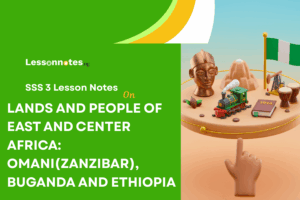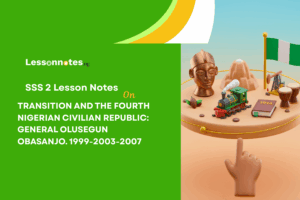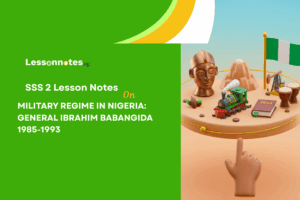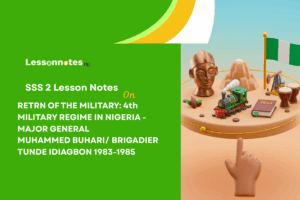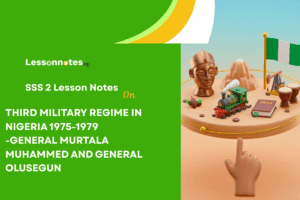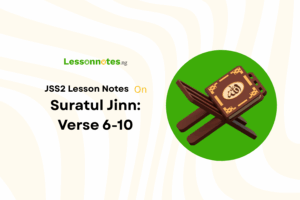THE HAUSA STATE UP TO 1800 SS1 Nigerian History Lesson Note
Download Lesson NoteTopic: THE HAUSA STATE UP TO 1800
The Hausa states include Zaria, Kano, Katsina, Biram, Gobir, Daura and Rano. They are referred to as legitimate sons.

Hausaland refers to the areas in what is now northern Nigeria and southern Niger where Hausa people have lived for many centuries. Between the 11th and 19th centuries, the Hausa people developed several powerful states or kingdoms. These states included Kano, Katsina, Zaria, Gobir, Rano, Biram, and Daura. They are sometimes called the “Hausa Bakwai” (the Seven Hausa States). This lesson explores the important factors that helped these states to form and grow strong, the political systems they created, and how their economy worked.
Factors That Influenced State Formation in Hausaland
- Good Leadership
Strong leaders played a crucial role in creating Hausa states:
- Skilled rulers united different groups of people
- Kings (called Sarakuna, singular: Sarki) created effective governments
- Leaders made wise decisions about trade and defense
- They established laws and maintained order
- Many Hausa states have legends about founding figures
- For example, the legend of Bayajidda who founded the Hausa dynasties
- Good rulers attracted followers and expanded their territories
- They built relationships with neighboring peoples
- Strong leadership helped states survive for centuries
- Agriculture and Fertile Land
Farming provided the foundation for Hausa states:
- The savannah region had good soil for growing crops
- Reliable rainfall in most years supported agriculture
- Hausa farmers grew grains like millet, sorghum, and rice
- They also cultivated vegetables, cotton, and indigo
- Surplus food allowed people to specialize in other jobs
- Some could become craftspeople, traders, or officials
- Population grew because of food security
- Taxes on farms provided revenue for the state
- Agricultural wealth supported the ruling class
- Farming communities became the building blocks of larger states
- Mineral Resources
Natural resources contributed to state development:
- Iron ore was especially important in Hausaland
- Iron tools made farming more productive
- Iron weapons improved military strength
- Blacksmiths became important members of society
- Mining created specialized work communities
- Salt was another valuable resource in some areas
- Control of mineral deposits gave power to rulers
- Trade in minerals connected Hausa states to other regions
- Craftspeople used local materials to make valuable goods
- Resources provided wealth that strengthened states
- Strategic Location on Trade Routes
Trade was vital to the growth of Hausa states:
- Hausaland was located between North Africa and forest regions of West Africa
- Trans-Saharan trade routes passed through Hausa territories
- Traders brought goods from the Mediterranean world
- Items like salt, textiles, books, and luxury goods came from the north
- Kola nuts, gold, ivory, and slaves went northward
- Hausa cities became important trading centers
- Kano, especially, grew wealthy as a commercial hub
- Markets attracted people from different regions
- Trading networks spread Hausa language and culture
- Control of trade routes gave rulers power and wealth
- Walled Cities and Defense Systems
Security was essential for state development:
- Hausa states built impressive city walls (called “ganuwa”)
- Some walls were up to 30 feet high and 40 feet thick
- Kano’s wall was about 14 miles long with 15 gates
- Walls protected against raiders and enemy armies
- Gates could be closed at night for safety
- Defensive structures gave cities control over surrounding areas
- Security allowed trade and farming to flourish
- Military organization developed to defend the walls
- Safe cities attracted people seeking protection
- Walled cities became centers of government and culture
- Introduction of Islam
Religion influenced state formation in important ways:
- Islam arrived in Hausaland around the 14th century
- Brought by traders and scholars from North Africa and Mali
- Kano’s ruler Muhammad Rumfa (1463-1499) was an early royal convert
- Islam provided a writing system (Arabic script)
- Written records improved government administration
- Islamic law (Sharia) offered a legal framework
- Muslim scholars served as advisors to rulers
- Islamic education created an educated class
- Connections to the wider Muslim world brought new ideas
- Religious identity helped unite diverse peoples
- Social Organization and Urbanization
Hausa society supported state formation:
- Family and kinship groups formed the basis of society
- Craft guilds organized specialized workers
- Cities grew as centers of administration and trade
- Urban areas developed distinct quarters for different groups
- Social hierarchies became more complex
- Division of labor allowed for specialized skills
- Communities of foreigners (like Arab traders) added diversity
- Patron-client relationships created social bonds
- Cities became centers of culture and learning
- Growing population supported state expansion
Political Institutions of the Hausa States
The Sarki (King)
At the top of the political system was the ruler:
- Called “Sarki” in Hausa language
- Held supreme political and military authority
- Often claimed divine right to rule
- Lived in a palace called “gidan sarki”
- Appointed officials and judges
- Led armies in wartime
- Collected taxes and tributes
- Served as final court of appeal
- Could make or change laws
- Position usually passed to male relatives
The Council of State
The Sarki was assisted by important advisors:
- Made up of senior officials and nobles
- Advised the king on important matters
- Represented different interests in the kingdom
- Included both hereditary and appointed officials
- Helped maintain balance of power
- Members had specific responsibilities
- Council met regularly to discuss state affairs
- Served as a check on the king’s power
- Helped ensure smooth succession between rulers
- Provided continuity in government
Key Officials in Hausa Governments
Many specialized officials helped run the state:
- Madawaki
- Commander of the cavalry (horsemen)
- Led the army in battle
- Often one of the most powerful officials
- Sometimes acted as chief minister
- Responsible for military training and readiness
- Galadima
- Administrator of the capital city
- Managed the territory north of the capital
- Often a senior prince or noble
- Collected taxes in his area
- Reported directly to the Sarki
- Dogari
- Chief of the king’s bodyguard
- Maintained security at the palace
- Led the palace police force
- Enforced the king’s orders
- Controlled access to the ruler
- Sarkin Yamma
- Governor of the western territories
- Represented the king in distant areas
- Collected taxes from his region
- Led local military forces
- Similar officials governed other directions
- Sarki Yan Doka
- Chief of police or commissioner
- Maintained public order
- Investigated crimes
- Arrested wrongdoers
- Enforced court decisions
- Qadis and Alkalis
- Islamic judges who applied Sharia law
- Settled disputes between people
- Advised on religious matters
- Maintained legal records
- Ensured justice in the community
Other Important Officials
The government included many specialized roles:
- Waziri: Chief minister or vizier
- Sarkin Fada: Head of the palace administration
- Sarkin Kasuwa: Market inspector
- Jakada: Ambassador to other states
- Sarkin Ruwa: Water controller
- Sarkin Pawa: Butchers’ supervisor
- Dan Rimi: Official in charge of diplomatic gifts
The Economy of Hausaland
Agriculture
Farming was the foundation of the Hausa economy:
- Most people were farmers
- Grew staple crops like millet, sorghum, and rice
- Produced vegetables such as onions, peppers, and tomatoes
- Cultivated cotton for textiles
- Grew indigo for dye
- Some specialized in fruit trees
- Used simple tools like hoes and digging sticks
- Practiced crop rotation to maintain soil fertility
- Stored grain in special granaries
- Seasonal rains determined planting cycles
Livestock Raising
Animals were an important part of the economy:
- Cattle were particularly valuable
- Fulani herdsmen often managed cattle for Hausa owners
- Sheep and goats were common
- Horses were prestigious and used by nobility
- Donkeys and camels served as pack animals
- Animal products included milk, meat, and hides
- Manure was used to fertilize fields
- Livestock represented wealth and social status
- Animals were used in religious sacrifices
- Trade in animals and animal products was significant
Trade and Commerce
Trading activities were highly developed:
- Local markets operated in villages and towns
- Larger regional markets met regularly
- Long-distance trade connected to North Africa and beyond
- Specialized merchant classes emerged
- Kola nuts from forest regions were valuable trade items
- Leather goods like shoes, bags, and saddles were famous exports
- Textiles, especially dyed cloth, were important products
- Salt was a crucial trade commodity
- Slaves were unfortunately part of the trade system
- Currency included cowrie shells and gold
Crafts and Manufacturing
Specialized production was well-developed:
- Textile production (spinning, weaving, dyeing)
- Leather working (tanning, tooling, decorating)
- Blacksmithing and metalworking
- Pottery making
- Woodworking
- Basket weaving
- Craft workers often organized in guilds
- Skills passed down through families
- Distinct quarters in cities for different crafts
- Products supplied local needs and export markets
Revenue and Taxation
Hausa states collected resources through various means:
- Kudin Kasa: Land tax paid by farmers
- Jangali: Tax on livestock
- Gaisuwa: Tribute gifts from subordinates
- Zakkat: Islamic religious tax
- Market taxes on traders and merchants
- Tolls collected at city gates
- Fines from legal cases
- Booty from military campaigns
- Customs duties on goods entering the territory
- This revenue supported the ruler, officials, and government activities
Conclusion
The formation of states in Hausaland was influenced by many factors working together. Good leadership provided the vision and organization. Agriculture and natural resources created wealth. Strategic location on trade routes connected Hausa states to a wider world. Walled cities offered protection and became centers of government. Islam brought literacy and new ideas. These factors combined to create strong, lasting states with complex political institutions and diverse economies.
The political systems that developed in Hausa states were sophisticated, with the Sarki at the top supported by councils and specialized officials. This government structure allowed for effective administration of growing territories and populations.
The economy of Hausaland was diverse and productive. While most people farmed, there were also specialized traders, craftspeople, and service providers. This economic complexity supported urban development and state power. The legacy of these states can still be seen today in northern Nigeria, where Hausa culture, language, and traditions remain important.






